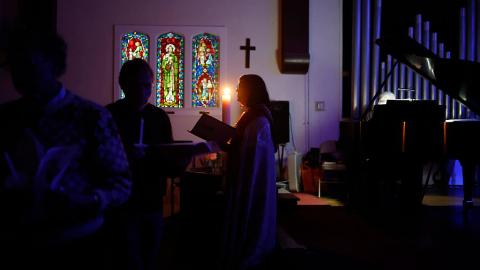
The bishop of San Bernardino, in California, is allowing churchgoers to not attend Sunday Mass as a result of immigration raids being carried out by the Trump administration.
Concretely, Alberto Rojas issued a letter in which he said that "in light of the pastoral needs of our diocese and the concerns expressed by many of our brothers and sisters regarding fears of attending Mass due to potential immigration enforcement actions by civil authorities, I, as your shepherd, issue this decree."
The document claims that all faithful who, due to "genuine fear of immigration enforcement actions, are unable to attend Sunday Mass or Masses on holy days of obligation are dispensed from this obligation."
The bishop went on to say that those dispensed are encouraged to "maintain their spiritual communion with Christ and His Church through acts of personal prayer, reading of Sacred Scripture, or participation in devotions such as the Rosary or the Divine Mercy Chaplet." They could also stream services, he added.
Rojas also encourages ministers to "provide compassionate support to those affected by this fear, ensuring that their spiritual needs are met in our communities." The decree will remain in effect "further notice or until such time as the circumstances necessitating this decree are sufficiently resolved."
The authorization comes as enforcement raids have reportedly led many in the state to withdraw from public life, with mounting fear reshaping daily routine, according to a report by the LA Times.
Victor Narro, project director at the UCLA Labor Center, described the situation to the outlet as "a harmful form of racial profiling combined with the suspension of constitutional rights and due process."
Pastor Carlos Rincon of a Pentecostal church in East Los Angeles reported that his congregation has halved in size. In-person services have largely been replaced by Facebook and Zoom gatherings. He also recounted the case of a congregant who postponed chemotherapy out of fear of arrest.
The increase in home confinement extends beyond religious life. Luz Gallegos, executive director of TODEC Legal Center, said many immigrants only leave home for work and are now receiving groceries through deliveries or community support. Some have even switched to pagers or changed phone providers, concerned about digital surveillance.
In April, a federal judge in Washington D.C. rejected a request by over two dozen Christian and Jewish religious groups to block immigration enforcement operations at houses of worship.
The groups had filed a lawsuit back in February challenging the Trump administration's decision to end the Department of Homeland Security's "sensitive locations" policy, which protected such places from immigration enforcement.
© 2025 Latin Times. All rights reserved. Do not reproduce without permission.





